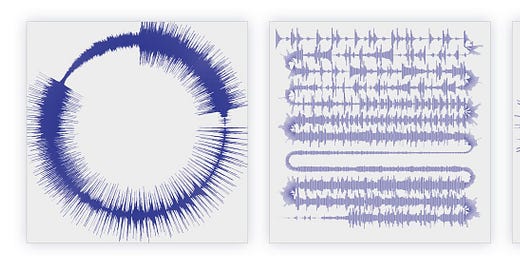✖️ How to spot scammers in the music NFT space
And: Niche streaming services; AI turns music into stems; OnlyFans & payment processors; data-driven album covers; livestreaming post-pandemic; Sonos vs Google
It’s estimated that 80% of 2017’s ‘initial coin offerings’ were scams with $9 million being lost to them daily. There’s a historical impetus to be clear and transparent, so people can verify the legitimacy of projects. Unfortunately this is not the case for all companies selling NFTs and other types of tokens. So I wrote a guide for companies & their customers about the importance of:
verifiable ‘on-chain’ transactions
roadmaps and whitepapers
skin in the game
team pages
Err on the side of caution, friends. 💙
TECH
🥳 Making PartyBid History with Songcamp Elektra and Beets DAO (Josh Cornelius)
In case you’re new to the newsletter: I recently wrote about fractionalized NFTs — a way to collectively bid on and own NFTs. Now multiple DAOs (Mirror Club & Beets) competed with collective bids for music NFTs dropped by Songcamp Elektra (disclosure: I’m involved in the latter project / DAO). This article details the blow by blow.
⛓ Resistant protocols: How decentralization evolves (John Backus)
This newsletter contains 2 definitive longreads — here’s the first one. It’s about the ideals in decentralization, the law & the frictions experienced by the likes of Napster, Kazaa, and BitTorrent. From 2018, but worth the read in the context of a renewed push to decentralize the web.
“Decentralized technologies don’t take the legally impossible and make it unstoppable. Decentralization is a tactic for diffusing risk for many and lowering the risk for the activists that operate the most sensitive parts of the system.”
h/t Dan for the link.
🔎 One Drop and MapleStream are very focused streaming services (Stuart Dredge)
“More innovation on these very-focused DSPs can at the very least nudge the bigger players along, and if they can find workable business models to live alongside those 900lb gorillas, that would be a healthy thing for the industry too.”
🔊 Sonos vs. Google: The Smart Speaker Patent War Is Heating Up (Tatiana Cirisano)
“The same month Sonos filed its initial complaint, Sonos CEO Patrick Spence argued in a testimony before Congress that technology behemoths like Google practice so-called "efficient infringement" by copying designs from smaller companies and selling them for cheaper prices, betting that the profit will outweigh any costs of resulting litigation.”
✂️ Audioshake - an AI to open up music to new showcases (Audioshake)
“Audioshake AI can break songs into vocal, drums, bass, guitar, and other — as well as instantly create instrumentals.”
I missed their announcement in January and hadn’t heard about them until now: they recently won Sony’s ‘Music Demixing Challenge’. It has cool implications for music for which the stems simply aren’t available, from sync opportunities to new remixes to karaoke. Audio source separation can also be used for hearing aids, although that specific use case is not mentioned in Audioshake’s materials.
X
👅 Targeting taste communities (Ana Andjelic)
“When we shift our focus from an individual to their network of relationships, we start asking different questions: how the communities an individual belongs are structured; what is their dynamics; how the influence spreads within them; who are the most active and/or valuable members. This shift reveals not our inferred, but our actual taste.”
📺 How does livestreaming fit in a post-pandemic industry? (Gordon Masson)
A thorough & rather definitive longread for this moment in the pandemic.
“Veeps is installing its technology in more than 60 Live Nation venues, including institutions like The Wiltern in Los Angeles, where From the Wiltern shows are already available to stream from $15 (€13) a ticket. Elsewhere, YouTube is working on a new 6,000-seat theatre in Los Angeles from where it intends to stream shows,”
🔞 OnlyFans is ditching porn because of payment processors’ terms (Post-Culture Review)
Hot on the heels of reports that the company is having issues finding investors who want to attach their name to porn, is a policy update (per Oct 1) that bans any sexually explicit imagery. There’s some speculation the sudden move is due to a BBC investigation into illegal activity on the platform, but it’s more likely that it’s due to a previous investigation into PornHub which caused payment processors to cut ties and now has prompted MasterCard to update its policies (Possibly NSFW! No nudity, but Xbiz.com reports on the adult entertainment industry).
What will be left in the end? Hard to say… Perhaps Only Music Fans?
📀 Data-Driven Album Covers (Carni Klirs)
“I mainly use a software called Sonic Visualizer. That allows me to load the waveform in vector (SVG) format, and from there, I can play with it using other software like Adobe Illustrator. Sometimes I play with some scripts and a couple of lines of code to convert the song into numbers.”
Tiziana Alocci
🇦🇫 Afghan orchestras in peril: ‘I cannot imagine a society without music’ (Harriet Sherwood)
“The last time the Taliban were in power, Afghanistan became “a silent nation”, said Ahmad Sarmast. “People were not allowed to listen to or practise music, they were not allowed to experience the beauty of music.””
LIVESTREAM
My co-editor Maarten Walraven is speaking about his project GÂRDEN and music in the creator economy this Wednesday, 11pm CEST in a livestreamed podcast recording for the Created Economy.
MUSIC
Not the most niche thing I’ve ever shared in this newsletter, but it will be interesting to see how many clicks this Dutch hiphop track gets. Fresku is a comedian, actor, and one of The Netherlands’ finest rappers. His latest track Motion shows his storytelling skills, ability to go into deep subject matter despite having a reputation as a comedian, and perhaps the easiest part to pick up if you don’t understand Dutch: his intricate rhyme schemes.




